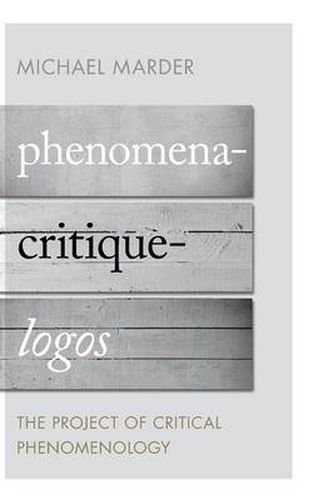Readings Newsletter
Become a Readings Member to make your shopping experience even easier.
Sign in or sign up for free!
You’re not far away from qualifying for FREE standard shipping within Australia
You’ve qualified for FREE standard shipping within Australia
The cart is loading…






One commonplace assumption in Continental philosophy circles today is that there is an unbridgeable gap between, on the one hand, Kantian and post-Kantian critical tradition in German thought and, on the other, Husserlian and post-Husserlian phenomenology.
Phenomena-Critique-Logos challenges this assumption and endeavors to work out a systematic concept of critique, using the resources of phenomenology itself. In this innovative work, Michael Marder argues that critique is situated at the very heart of phenomenology, traversing the Husserlian oeuvre and regulating the relation between phenomena and logos, conceived in its multiple senses as reason, logic, a mode of thinking, study and word. Having outlined the features of phenomenology as a kind of critique, Marder goes on to demonstrate how it is applicable to ontology, ethics and politics, through sustained readings of Heidegger, Levinas, Arendt and Derrida, as well as through an original elaboration of phenomenological critique pertinent to each of these fields.
$9.00 standard shipping within Australia
FREE standard shipping within Australia for orders over $100.00
Express & International shipping calculated at checkout
One commonplace assumption in Continental philosophy circles today is that there is an unbridgeable gap between, on the one hand, Kantian and post-Kantian critical tradition in German thought and, on the other, Husserlian and post-Husserlian phenomenology.
Phenomena-Critique-Logos challenges this assumption and endeavors to work out a systematic concept of critique, using the resources of phenomenology itself. In this innovative work, Michael Marder argues that critique is situated at the very heart of phenomenology, traversing the Husserlian oeuvre and regulating the relation between phenomena and logos, conceived in its multiple senses as reason, logic, a mode of thinking, study and word. Having outlined the features of phenomenology as a kind of critique, Marder goes on to demonstrate how it is applicable to ontology, ethics and politics, through sustained readings of Heidegger, Levinas, Arendt and Derrida, as well as through an original elaboration of phenomenological critique pertinent to each of these fields.